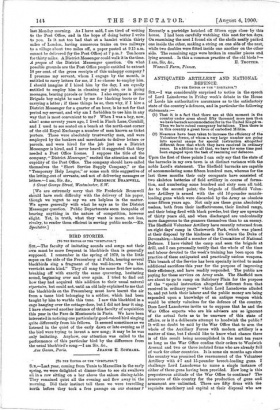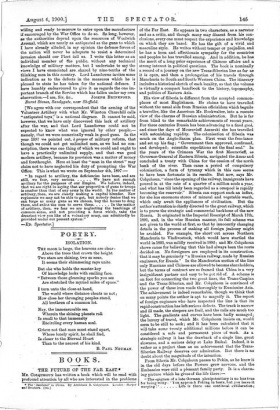ANTIQUATED ARTILLERY AND NATIONAL DEFENCE.
• [To THE EDITOR OF TIIR " SeEcTexon.."11 SIR,—I was considerably surprised to notice in the speech
of Lord Lansdowne in Friday week's debate in the House of Lords his authoritative assurances as to the satisfactory state of the country's defences, and in particular the following statements :—
(1) That it is a fact that there are at this moment in the country under arms about fifty thousand more men than we have barrack accommodation for in the United Kingdom.
• Then we ha7e raised emergency battalions. Then there is in this country a great force of embodied Militia.
. (2) Measures have been taken to increase the efficiency of the Volunteer forces, of whom a very large number are going into special camps for special instruction altogether different from that which they have received in ordinary' years. In addition to all that, we have for some time past been engaged upon the task of rearming our defences.
Upon the first of these points I can only say that the state of the barracks in my own town is at distinct variance with the noble Lord's statement. The Sheffield barracks are capable of accommodating some fifteen hundred men, whereas for the last three months their only occupants have consisted of two skeleton batteries of field artillery in course of forma- tion, and numbering some hundred and sixty men all told.
As to the second point,' the brigade of Sheffield Volun- teer Artillery is armed with the old 16-pounder muzzle- loading guns which were discarded by the Army as obsolete some fifteen years ago. Not only are these guns absolutely useless, both from their ineffectiveness, their limited range, and their being fired with black powder, but they are upwards of thirty years old, and when discharged are undoubtedly more dangerous to the gunners themselves than to an enemy. The Sheffield Volunteer Artillery have recently returned from an eight days' camp in Chatsworth Park, which was placed at their disposal by the kindness of his Grace the Duke of Devonshire,—himself a member of the Comraittee of National Defence. I have visited the camp and seen the brigade at drill, and I can personally testify that the whole of the time and labour devoted to the week's training has been upon the practice of these antiquated and practically useless weapons. This branch of the Service has been specially invited to make additional sacrifices this year for the purpose of improving their efficiency, and have readily responded. The public are paying for these services on Army scale. The Sheffield men are about to go to camp on Salisbury Plain for the purpose of the "special instruction altogether different from that received in ordinary years" which Lord Lansdowne alluded to, and yet both their labour and the public money are being expended upon a knowledge of an antique weapon which would be utterly valueless for the defence of the country. Does Lord Lansdowne invite us to suppose that he and the War Office experts who are his advisers are so ignorant of the actual facts as to be unaware of this Oat° of
affairs, or is it a deliberate attempt to hoodwink the public ? It will no doubt be said by the War Office that to arm the
whole of the Auxiliary Forces with modern artillery is a matter of time, but I should like to know what chance there is of this result being accomplished in the next ten years as long as the War Office confine their orders to Woolwich Arsenal and two or three isolated firms who are already full
of work for other countries. It is some six months ago since the country was promised the rearmament of the Volunteer
Artillery with 4-7 and 15-pounder breech-loading guns. I challenge Lord Lansdowne to name a single instance of either of these guns having been provided. How long is this
preposterous attitude of the War Office to continue ? The resources of this country for the production of guns and • armament are unlimited. There -are fifty firms with the requisite machinery and capital at their disposal who are willing and ready to-morrow to enter upon the manufacture if encouraged by the War Office to do so. So long, however, asr the authorities depend upon the resources of Woolwich Arsenal, which are nearly as antiquated as the guns to which I have already alluded, in my opinion the defence forces of the nation will never be adequate to resist a determined invasion should our Fleet fail us. I write this letter as an individual member of the public, without any technical knowledge of military matters, but I undertake to say the views I have enunciated are. shared by nine-tenths of the thinking men in this country. Lord Lansdowne invites some indication as to the defects in the measures which he is pleased to state he has taken for the national defence. I have humbly endeavoured to give it as regards the one im- portant branch of the Service which has fallen under my own
observation.—I am, Sir, &c., JOSEPH BRINKPOILD.
Burnt Stones, Sandygate, near Sheffield.
[We agree with our correspondent that the arming of the Volunteer Artillery with what Mr. Winston Churchill calls "antiquated toys," is a national disgrace. It cannot be said, however, that we have only discovered this lack of artillery after the war, and that Lord Lansdowne could not be
expected to know what was ignored by other people,—
namely, that we were numerically weak in good guns. In the year 1897 we pointed out, apropos of military reform, that though we could not get unlimited men, as we had no con- scription, there was one thing of which we could and ought to have a practically unlimited supply, and that was good modern artillery, because its provision was a matter of money and forethought. Here at least the "man in the street" may claim not to have neglected his duty of prompting the War Office. This is what we wrote on September 4th, 1897 :—
" In regard to artillery, the deficiencies have been, and are
still, we fear, very serious. We have not enough artillery for the purposes of our Empire. We believe, indeed, that we are right in saying that our proportion of guns to troops is smaller than that of any army in the world. In the matter of artillery, then, we are clearly making a capital blunder. New regiments we may not be able to get, but nobody denies that we can forge as many guns as we choose, buy the horses to drag them, and enlist the men to serve them In the matter of artillery, then, we fear we are neglecting the teachings of common sense, and not providing a force which, take the dreariest you like of a voluntary army, can admittedly be provided under our present system."
—En. Spectator.]



































 Previous page
Previous page